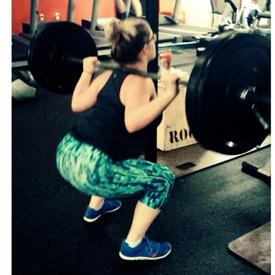Anxiety & Exercising
Options

shiseido_faerie
Posts: 771 Member
This is a little hard for me but i'm just going to put it out there incase anyone else has experienced it...
About 11 years ago I was diagnosed with a panic disorder, we're talking at one point it was really difficult to leave the house! I'm not medicated and have really come a long way over the years, i've reached a point where it doesn't interfere with my life nearly as much, i'm usually pretty ok, and even when i'm not so ok I can usually stay in the situation that's making me uncomfortable now. What i'm running into lately is this...I've recently started exercising, and I love it, i'm feeling stronger and more in shape, but what i'm finding is that the adrenaline rush that you get from exercising sometimes triggers an attack for me. I know that they say exercise can help anxiety by reducing stress, but am wondering how to get past the adrenaline feeling being a trigger? I know it's probably a long shot but..has anyone else experienced this? And if so, have you found anything that helps? I want that post exercise feeling to be a great energtic full of life feeling, not a holy crap i'm going to die feeling lol.
Any thoughts would be appreciated
About 11 years ago I was diagnosed with a panic disorder, we're talking at one point it was really difficult to leave the house! I'm not medicated and have really come a long way over the years, i've reached a point where it doesn't interfere with my life nearly as much, i'm usually pretty ok, and even when i'm not so ok I can usually stay in the situation that's making me uncomfortable now. What i'm running into lately is this...I've recently started exercising, and I love it, i'm feeling stronger and more in shape, but what i'm finding is that the adrenaline rush that you get from exercising sometimes triggers an attack for me. I know that they say exercise can help anxiety by reducing stress, but am wondering how to get past the adrenaline feeling being a trigger? I know it's probably a long shot but..has anyone else experienced this? And if so, have you found anything that helps? I want that post exercise feeling to be a great energtic full of life feeling, not a holy crap i'm going to die feeling lol.
Any thoughts would be appreciated
0
Replies
-
Now and then I go through periods where I have panic attacks. I found this spring while working out at the gym that it would sometimes bring on an attack. I'm not sure if its the same as you are feeling but I would feel like I couldn't breath, my heart would be pounding too hard, light headedness and of course an overwhelming sense of panic.
what I found works for me, is when that begins to happen, I immediately ease up on the exercise immensely until the feelings begin to subside. I don't stop exercising but I do change what I'm doing. For example if I am on the eliptical when it happens, I immediately drop my arms and slow down to a slow walk. When the moment has passed I begin to bring my exercise level back up again slowly.
Also, I try hard to slow down my breathing. I take slower deeper in breaths, and regulate a long slow exhale. I find it helps to regulate the body back to normal.
Anyway, that's what works for me. But it might be worth talking to your doctor to see if there is anything else you could do or should do.0 -
I have been researching anxiety issues because I've had them myself in the past and for some reason I am having them again and I wonder what is wrong with me that I can't get my emotions under control... it's frustrating and I understand your pain.... I got this information from a site called "womentowomen.com", check it out when you can....
Anxiety relief: natural treatments for anxiety
Relief from chronic anxiety comes from restoring your body’s natural equilibrium: by learning to process your emotional history while making changes to lifestyle, nutrition, exercise habits, and hormonal balance. Here’s what we recommend:
Fresh air, sunshine, and exercise. A healthy measure of each will not only to help you manage better when under pressure, but aid restorative sleep at the end of the day. (No need to overdo it — you want to soothe your nerves, not add stress!)
Deliberate dietary choices. Sound nutrition so heavily influences our hormones and transmitters — it’s simply a must. Eat the majority of your protein early in the day; choose whole, nutrient-rich foods with a low glycemic index; and don’t let yourself get too full or too hungry — three simple precepts to normalize your two major hormones, insulin and cortisol, which in turn will help optimize your neurotransmitters and balance your sex hormones.
Eliminate potential food allergens. Gluten, for example, is notoriously associated with anxiety. If you are experiencing anxiety-related gastrointestinal problems, an elimination diet may help you identify any sensitivities at play.
Consider nutritional supplements. We encourage all women with anxiety symptoms to take a medical-grade multivitamin/mineral complex like the ones offered in our Personal Programs. Some nutritionists regard the B-complex as the most important nutritional factor for healthy nerve cells, but there is also evidence that omega-3 fatty acids can help reduce symptoms of anxiety. Likewise, vitamin D is a key nutrient for mood, and deficiency is widespread. If you’re elderly, overweight, dark-skinned, live in a northern climate, or don’t get much sun, vitamin D testing and appropriate supplementation is strongly suggested.
Balance your sex hormones. When anxiety is related to perimenopause or menopause, gentle endocrine support can often restore balance. We recommend phytotherapy or bioidentical HRT. Botanical therapies such as passionflower, valerian, and chamomile have been used for many generations to dissolve restlessness, nervousness, and anxiety.
About your emotional work... Just as you developed coping skills as a child, so too can you unlearn old patterns that no longer serve you. Don’t be discouraged by the knowledge that our brains aren’t quite as plastic as in adulthood as in childhood; it may take commitment and perseverance, but you can learn new skills to free yourself of the emotional and physical trappings of anxiety. These include methodologies that quiet the nervous system, raise awareness of your personal emotional triggers, and provide coping strategies you can draw on when nerve-wracking situations arise. Our patients troubled by anxiety have done well with the Hoffman Quadrinity Process, Emotional Freedom Techniques, and integrative manual therapy. Other methods proven helpful include cognitive behavioral therapy (CBT), qi gong, and transcendental meditation (TM).
Targeted neurotransmitter support. If you’ve tried the above measures and your anxiety problem continues to seem entrenched, you may want to talk to a functional healthcare practitioner about neurotransmitter testing and support. At Women to Women we use these test results to select neurotransmitter precursors, modulators, and enzymatic cofactors that support neurotransmitter and receptor balance, communication, and responsiveness. (This process should be supervised by a qualified medical provider.)
I hope this helps! Please add me as a friend if you want to!!
Holly0 -
*raises hand*
Me too. A year ago I could not leave the house, I was literally stuck. Sometimes I couldn't even go near the front door, I'd avoid looking at it! Now I go to the gym three times a week (always at the same time, always when it's quiet) and it does help with the anxiety, but I tend to push even harder the more anxious I am feeling because it's like an outlet for it.
Feel free to add me if you want 0
0 -
I know EXACTLY how you feel.
I have panic disorder as well, it runs in my family. My anxiety was at it's worst one year ago, and I wouldn't leave my house, I was constantly depressed, I thought there was for sure something wrong with me and that working out was going to trigger it, so I stopped and gained all of the 12 pounds I had worked so hard to lose. I saw a ton of doctors, who did a ton of testing on me, including a week long heart monitoring holster, and the only thing they found was that I was overweight (haha, which is obvious..).
My heart racing during workouts freaked me out at the time, but i've been keeping up with it, and I find that my anxiety is literally almost gone.
Your body, I promise, can handle A LOT more than what your anxiety is leading you to believe.
When I used to start to panic while I was working out (which when I panic, I feel like I'm for sure about to die or having some sort of heart/brain failure), I talk myself out of it, and focus on mini goals, and when I reached my mini goals, which I always did, I realized I could keep going and that my body was made to endure this kind of activity.
YOU CAN DO IT!! I SWEAR!!! YOU JUST HAVE TO KEEP GOING!!! 0
0 -
Ha! Thank you Garae, I also went through the series of tests over the years, convinced that it could not possibly just be anxiety! It seemed to happen in so many different situations that I thought it had to be something really wrong. I had heart monitoring, I went to a respirologist (sp?), and it was concluded that I was indeed just having a panic attack! My doctors advice "do it anyways." I try to stick with things, talk my way through them, acknowledge to myself that it's just anxiety but everything is fine. Usually it works, but i'm finding with exercise it so closely mimicks symptoms that it's a little harder! The last couple of days i've been trying meditating a little while after to calm myself down and relax. Hopefully that works. Thanks so much for your support!
Thank you ALL for your support and responses, it's so very nice to hear i'm not the only one!0 -
Meditating is good!
A good workout that is effective but wont raise your heart rate as much is pilates.. give it a go! Classes are available on demand if you have it!!
Also, water aerobics are good to do if you can too! The water provides great resistance for your entire body, and you can do it all in the shallow end!! Also, maybe working out with somebody who knows you have anxiety and can give you support during your workout! You just have to find whatever works for you, I know you can do it!!!
Another thing that always worked for me, since i have seasonal depression as well, is working outside during the summer. That can be just an hour long walk! The vitamin D in the sun does a body and mind good!!
BUT!! If you'd rather stay in, walking through the mall window shopping is good exercise too!!0
Categories
- All Categories
- 1.4M Health, Wellness and Goals
- 391.9K Introduce Yourself
- 43.5K Getting Started
- 259.8K Health and Weight Loss
- 175.7K Food and Nutrition
- 47.3K Recipes
- 232.3K Fitness and Exercise
- 400 Sleep, Mindfulness and Overall Wellness
- 6.4K Goal: Maintaining Weight
- 8.5K Goal: Gaining Weight and Body Building
- 152.8K Motivation and Support
- 7.9K Challenges
- 1.3K Debate Club
- 96.3K Chit-Chat
- 2.5K Fun and Games
- 3.4K MyFitnessPal Information
- 23 News and Announcements
- 988 Feature Suggestions and Ideas
- 2.4K MyFitnessPal Tech Support Questions



